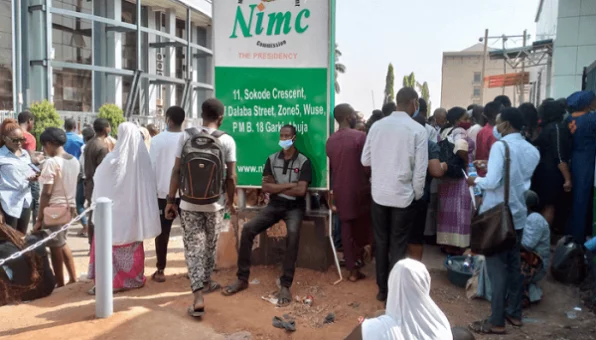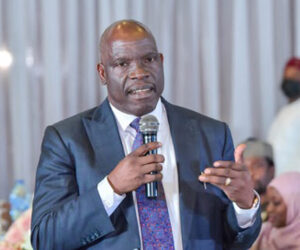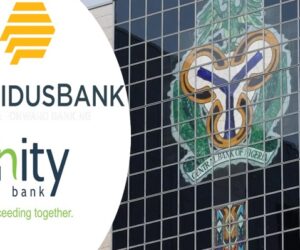President Bola Ahmed Tinubu said over 126 million of the 230 million Nigerians enrolled in the National Identity Database.
The figure Blueprint.ng gathered, indicates that some 114 million citizens are yet to be captured in the scheme.
He also said the federal government has expanded the system’s capacity from 100 million to 250 million records to ensure universal coverage.
President Tinubu revealed this Tuesday at the 7th `National Day of Identity Day’ commemorated by the National Identity Management Commission (NIMC) in Abuja, with the theme: “Public Key Infrastructure: Backbone to Digital Public Infrastructure.”
Represented by the Secretary to the Government of the Federation (SGF), Senator George Akume, the president underscored the significance of the feat.
He said: “This is not just a number; it represents 126 million stories of visibility and empowerment. Workers can now claim pensions without fear of fraud, students can access loans with ease, and vulnerable groups can benefit from humanitarian support. This is the true power of identity, and this is the progress we celebrate.”
According to him, NIN had proven to be a key that unlocks opportunities, strengthens governance, and builds trust.
“The benefits of a secure and trusted identity system are immense. For our economy, it means greater inclusion, better planning, and stronger financial systems.
“For security, it means accurate identification, reduced criminal exploitation, and more effective protection of our people.
“For governance, it means precision in policy implementation, accountability in service delivery, and confidence in government. For the citizen, it means empowerment, visibility, and access to opportunities,” he said.
Tinubu said without PKI, digital platforms would be insecure.
“Today, the NIN enables students to access educational loans through NELFUND, supports business registration at the Corporate Affairs Commission, and strengthens the operations of the Nigeria Immigration Service.
“It underpins accurate data collection by the National Population Commission, enhances the efficiency of our tax system through the Federal Inland Revenue Service, and safeguards the integrity of our elections through the Independent National Electoral Commission.
“It streamlines admission processes with JAMB and secures the mobilization and deployment of corps members through the National Youth Service Corps,” he said.
“The NIN is already powering student loans through NELFUND, enabling business registration, strengthening elections, improving tax collection, and protecting pensions. It is the common key that unlocks opportunity, strengthens governance, and builds trust,” Tinubu added.
He further emphasised the importance of Public Key Infrastructure (PKI) as the backbone of digital trust, warning that without PKI, digital services remain vulnerable.
“PKI provides the secure foundation for our digital economy. It ensures that every Nigerian’s identity is trusted across platforms, attracting investment and enabling our citizens to engage seamlessly in a globalised world,” he said.
Tinubu said over 200 Diaspora centres had been established and special exercises conducted to register refugees, internally displaced persons, and inmates of correctional facilities.
Besides, Tinubu said the administration’s disability inclusion policy had trained over 5,000 enrolment agents to meet the needs of persons with disabilities, a development he said, indicates further inclusivity.
The president also said the NIMC had cleared over 2.5 million backlog records, launched mobile and web self-service platforms which processed more than 500,000 record updates, and deployed over 800 mobile enrolment devices nationwide.
He told the gathering that the Commission harmonised and linked data with 125 partner agencies such as the Nigeria Immigration Service (NIS) for passports, the Federal Inland Revenue Service(FIRS) for tax records, the National Population Commission(NPC) for birth registration, and the National Health Insurance Authority (NHIA) for healthcare enrolment.
This, the president said, “reduces duplication, saves costs, improves service delivery, and strengthens national security. Working with the NCC, NIMC enforced the NIN-SIM linkage, which has significantly reduced fraud.”
While showering encomiums on NIMC Director-General/CEO, Engr. Abisoye Coker-Odusote, for her innovation, discipline, and vision, the president said: “Under her stewardship, the NIN has truly become the foundation of our nation’s digital transformation. She represents the very spirit of the Renewed Hope Agenda.”
…NIMC boss on enrolment
In her remarks, the NIMC boss described the enrolment progress as a reflection of the organisation’s commitment to the United Nation’s Sustainable Development Goal 16.9, which targets legal identity for all.
Coker-Odusote said over 449,000 students had so far benefited from an N86.5billion loans facilitated by NIN verification since May 2024.
She also said, for a wider coverage, the agency had integrated NIN with agriculture programmes, allowing over 30,000 metric tonnes of rice to be shared among verified beneficiaries at subsidised rates.
Also, she said, financial inclusion for women and other vulnerable groups had drastically improved through digital identity.
…Tunji-Ojo
Also speaking, Minister of Interior Dr. Olubunmi Tunji-Ojo underscored the need for identity.
He said: “Countries that build secure DPI increase inclusion, lower transaction costs, and attract investment. PKI is the difference between digital convenience and digital risk.”
Identity management, the minister said, “demands procurement transparency, continuous penetration testing, third party conformity assessments and clear market rules for Certificate Authorities and Registration Authorities.
“It also requires continuous diplomacy: mutual recognition agreements with other jurisdictions, participation in regional PKI fora and alignment with international standards bodies so that our signatures and certificates are accepted.” Additional reports from NAN








